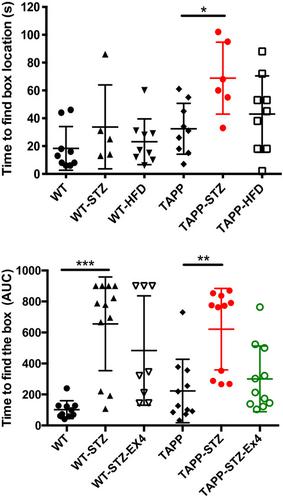当前位置:
X-MOL 学术
›
J. Neurosci. Res.
›
论文详情
Our official English website, www.x-mol.net, welcomes your feedback! (Note: you will need to create a separate account there.)
Insulin deficiency, but not resistance, exaggerates cognitive deficits in transgenic mice expressing human amyloid and tau proteins. Reversal by Exendin-4 treatment.
Journal of Neuroscience Research ( IF 4.2 ) Pub Date : 2020-08-01 , DOI: 10.1002/jnr.24706 Matthew R King 1 , Nicholas J Anderson 1 , Mihaela Deciu 1 , Lucie S Guernsey 1 , Morgan Cundiff 1 , Shohreh Hajizadeh 1 , Corinne G Jolivalt 1
Journal of Neuroscience Research ( IF 4.2 ) Pub Date : 2020-08-01 , DOI: 10.1002/jnr.24706 Matthew R King 1 , Nicholas J Anderson 1 , Mihaela Deciu 1 , Lucie S Guernsey 1 , Morgan Cundiff 1 , Shohreh Hajizadeh 1 , Corinne G Jolivalt 1
Affiliation

|
Epidemiological studies have pointed at diabetes as a risk factor for Alzheimer's disease (AD) and this has been supported by several studies in animal models of both type 1 and type 2 diabetes. However, side‐by‐side comparison of the two types of diabetes is limited. We investigated the role of insulin deficiency and insulin resistance in the development of memory impairments and the effect of Exendin‐4 (Ex4) treatment in a mouse model of AD. Three–4‐month‐old female wild type (WT) mice and mice overexpressing human tau and amyloid precursor protein (TAPP) were injected with streptozotocin (STZ) or fed a high‐fat diet (HFD). A second study was performed in TAPP‐STZ mice treated with Ex4, a long‐lasting analog of GLP‐1. Plasma and brain were collected at study termination for ELISA, Western blot, and immunohistochemistry analysis. Learning and memory deficits were impaired in TAPP transgenic mice compared with WT mice at the end of the study. Deficits were exaggerated by insulin deficiency in TAPP mice but 12 weeks of insulin resistance did not affect memory performances in either WT or TAPP mice. Levels of phosphorylated tau were increased in the brain of WT‐STZ and TAPP‐STZ mice but not in the brain of WT or TAPP mice on HFD. In the TAPP‐STZ mice, treatment with Ex4 initiated after established cognitive deficits ameliorated learning, but not memory, impairments. This was accompanied by the reduction of amyloid β and phosphorylated tau expression. Theses studies support the role of Ex4 in AD, independently from its actions on diabetes.
中文翻译:

在表达人类淀粉样蛋白和 tau 蛋白的转基因小鼠中,胰岛素缺乏而不是抵抗会加剧认知缺陷。Exendin-4 治疗逆转。
流行病学研究指出,糖尿病是阿尔茨海默病 (AD) 的一个危险因素,这一点得到了对 1 型和 2 型糖尿病动物模型的多项研究的支持。然而,两种类型糖尿病的并排比较是有限的。我们研究了胰岛素缺乏和胰岛素抵抗在记忆障碍发展中的作用以及 Exendin-4 (Ex4) 治疗在 AD 小鼠模型中的作用。3-4 个月大的雌性野生型 (WT) 小鼠和过表达人类 tau 和淀粉样前体蛋白 (TAPP) 的小鼠注射链脲佐菌素 (STZ) 或喂食高脂肪饮食 (HFD)。第二项研究是在用 Ex4(一种 GLP-1 的长效类似物)治疗的 TAPP-STZ 小鼠中进行的。在研究终止时收集血浆和大脑用于 ELISA、蛋白质印迹和免疫组织化学分析。在研究结束时,与 WT 小鼠相比,TAPP 转基因小鼠的学习和记忆缺陷受损。TAPP 小鼠的胰岛素缺乏会加剧这种缺陷,但 12 周的胰岛素抵抗不会影响 WT 或 TAPP 小鼠的记忆表现。WT-STZ 和 TAPP-STZ 小鼠大脑中磷酸化 tau 的水平增加,但使用 HFD 的 WT 或 TAPP 小鼠大脑中没有。在 TAPP-STZ 小鼠中,在出现认知缺陷后开始使用 Ex4 治疗改善了学习障碍,但不能改善记忆障碍。这伴随着淀粉样蛋白 β 和磷酸化 tau 表达的减少。这些研究支持 Ex4 在 AD 中的作用,与其对糖尿病的作用无关。TAPP 小鼠的胰岛素缺乏会加剧这种缺陷,但 12 周的胰岛素抵抗不会影响 WT 或 TAPP 小鼠的记忆表现。WT-STZ 和 TAPP-STZ 小鼠大脑中磷酸化 tau 的水平增加,但使用 HFD 的 WT 或 TAPP 小鼠大脑中没有。在 TAPP-STZ 小鼠中,在出现认知缺陷后开始使用 Ex4 治疗改善了学习障碍,但不能改善记忆障碍。这伴随着淀粉样蛋白 β 和磷酸化 tau 表达的减少。这些研究支持 Ex4 在 AD 中的作用,与其对糖尿病的作用无关。TAPP 小鼠的胰岛素缺乏会加剧这种缺陷,但 12 周的胰岛素抵抗不会影响 WT 或 TAPP 小鼠的记忆表现。WT-STZ 和 TAPP-STZ 小鼠大脑中磷酸化 tau 的水平增加,但使用 HFD 的 WT 或 TAPP 小鼠大脑中没有。在 TAPP-STZ 小鼠中,在出现认知缺陷后开始使用 Ex4 治疗改善了学习障碍,但不能改善记忆障碍。这伴随着淀粉样蛋白 β 和磷酸化 tau 表达的减少。这些研究支持 Ex4 在 AD 中的作用,与其对糖尿病的作用无关。在 TAPP-STZ 小鼠中,在出现认知缺陷后开始使用 Ex4 治疗改善了学习障碍,但不能改善记忆障碍。这伴随着淀粉样蛋白 β 和磷酸化 tau 表达的减少。这些研究支持 Ex4 在 AD 中的作用,与其对糖尿病的作用无关。在 TAPP-STZ 小鼠中,在出现认知缺陷后开始使用 Ex4 治疗改善了学习障碍,但不能改善记忆障碍。这伴随着淀粉样蛋白 β 和磷酸化 tau 表达的减少。这些研究支持 Ex4 在 AD 中的作用,与其对糖尿病的作用无关。
更新日期:2020-10-04
中文翻译:

在表达人类淀粉样蛋白和 tau 蛋白的转基因小鼠中,胰岛素缺乏而不是抵抗会加剧认知缺陷。Exendin-4 治疗逆转。
流行病学研究指出,糖尿病是阿尔茨海默病 (AD) 的一个危险因素,这一点得到了对 1 型和 2 型糖尿病动物模型的多项研究的支持。然而,两种类型糖尿病的并排比较是有限的。我们研究了胰岛素缺乏和胰岛素抵抗在记忆障碍发展中的作用以及 Exendin-4 (Ex4) 治疗在 AD 小鼠模型中的作用。3-4 个月大的雌性野生型 (WT) 小鼠和过表达人类 tau 和淀粉样前体蛋白 (TAPP) 的小鼠注射链脲佐菌素 (STZ) 或喂食高脂肪饮食 (HFD)。第二项研究是在用 Ex4(一种 GLP-1 的长效类似物)治疗的 TAPP-STZ 小鼠中进行的。在研究终止时收集血浆和大脑用于 ELISA、蛋白质印迹和免疫组织化学分析。在研究结束时,与 WT 小鼠相比,TAPP 转基因小鼠的学习和记忆缺陷受损。TAPP 小鼠的胰岛素缺乏会加剧这种缺陷,但 12 周的胰岛素抵抗不会影响 WT 或 TAPP 小鼠的记忆表现。WT-STZ 和 TAPP-STZ 小鼠大脑中磷酸化 tau 的水平增加,但使用 HFD 的 WT 或 TAPP 小鼠大脑中没有。在 TAPP-STZ 小鼠中,在出现认知缺陷后开始使用 Ex4 治疗改善了学习障碍,但不能改善记忆障碍。这伴随着淀粉样蛋白 β 和磷酸化 tau 表达的减少。这些研究支持 Ex4 在 AD 中的作用,与其对糖尿病的作用无关。TAPP 小鼠的胰岛素缺乏会加剧这种缺陷,但 12 周的胰岛素抵抗不会影响 WT 或 TAPP 小鼠的记忆表现。WT-STZ 和 TAPP-STZ 小鼠大脑中磷酸化 tau 的水平增加,但使用 HFD 的 WT 或 TAPP 小鼠大脑中没有。在 TAPP-STZ 小鼠中,在出现认知缺陷后开始使用 Ex4 治疗改善了学习障碍,但不能改善记忆障碍。这伴随着淀粉样蛋白 β 和磷酸化 tau 表达的减少。这些研究支持 Ex4 在 AD 中的作用,与其对糖尿病的作用无关。TAPP 小鼠的胰岛素缺乏会加剧这种缺陷,但 12 周的胰岛素抵抗不会影响 WT 或 TAPP 小鼠的记忆表现。WT-STZ 和 TAPP-STZ 小鼠大脑中磷酸化 tau 的水平增加,但使用 HFD 的 WT 或 TAPP 小鼠大脑中没有。在 TAPP-STZ 小鼠中,在出现认知缺陷后开始使用 Ex4 治疗改善了学习障碍,但不能改善记忆障碍。这伴随着淀粉样蛋白 β 和磷酸化 tau 表达的减少。这些研究支持 Ex4 在 AD 中的作用,与其对糖尿病的作用无关。在 TAPP-STZ 小鼠中,在出现认知缺陷后开始使用 Ex4 治疗改善了学习障碍,但不能改善记忆障碍。这伴随着淀粉样蛋白 β 和磷酸化 tau 表达的减少。这些研究支持 Ex4 在 AD 中的作用,与其对糖尿病的作用无关。在 TAPP-STZ 小鼠中,在出现认知缺陷后开始使用 Ex4 治疗改善了学习障碍,但不能改善记忆障碍。这伴随着淀粉样蛋白 β 和磷酸化 tau 表达的减少。这些研究支持 Ex4 在 AD 中的作用,与其对糖尿病的作用无关。



























 京公网安备 11010802027423号
京公网安备 11010802027423号